Toyota Aygo vs Hyundai Inster - Forskelle og priser i sammenligning
Sammenlign ydelse (72 HK vs 115 HK), bagagerum og pris (141800 kr. vs 187300 kr. ) på et øjeblik. Find ud af, hvilken bil der er det bedste valg for dig – Toyota Aygo eller Hyundai Inster?
Pris og effektivitet er ofte de første kriterier ved bilkøb. Her ser man, hvilken model der bedst kan betale sig på længere sigt – både ved tankning, opladning og indkøb.
Toyota Aygo har en klart synlig prisfordel – den starter allerede ved 141800 kr. , mens Hyundai Inster koster 187300 kr. . Forskellen er omkring 45528 kr..
Effekt, drejningsmoment og acceleration er de klassiske mål for bilentusiaster – og her træder forskellene tydeligt frem.
Når det gælder motorkraft, har Hyundai Inster en tydelig fordel – 115 HK mod 72 HK. Det svarer til en forskel på cirka 43 HK hk.
I acceleration fra 0 til 100 km/t er Hyundai Inster overbevisende hurtigere – den klarer sprinten på 10.60 s, mens Toyota Aygo bruger 15.50 s. Det er cirka 4.90 s hurtigere.
Der er også forskel på drejningsmomentet: Hyundai Inster trækker bemærkelsesværdig kraftigere med 147 Nm mod 93 Nm. Forskellen er omkring 54 Nm.
Kabineplads, bagagerum og lasteevne er afgørende i daglig brug. Her tæller komfort og fleksibilitet mest.
Begge biler har plads til 4 personer.
Hvad angår egenvægt, er Toyota Aygo tydelig lettere – 1015 kg mod 1380 kg. Forskellen er cirka 365 kg.
Når det kommer til bagagerumsplads, tilbyder Hyundai Inster i mindre grad mere – 280 L mod 231 L. Forskellen er omkring 49 L.
I lasteevne vinder Hyundai Inster minimal – 357 kg mod 345 kg. Forskellen er omkring 12 kg.
Hvem vinder duellen?
Hyundai Inster viser sig at være er klart overlegent og bliver dermed vores DriveDuel Champion!
I denne sammenligning er Hyundai Inster den mere komplette allrounder.
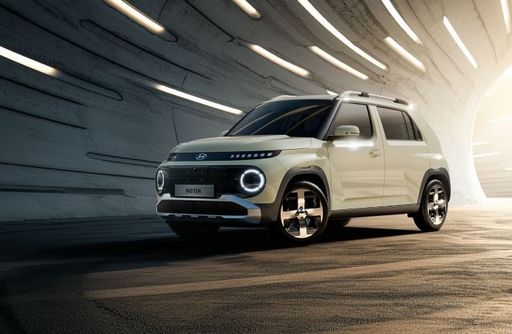
Hyundai Inster
Omkostninger og forbrug
Se detaljeret analyse
Motor og ydeevne
Se detaljeret analyse
Dimensioner og karrosseri
Se detaljeret analyse
Toyota Aygo
Toyota Aygo er en kvik og charmerende bybil, der med friske linjer og masser af personlighed skiller sig ud i byens jungle. Den er billig i drift og sjov at køre i trange gader, men kompromitterer på plads og luksus — perfekt som praktisk og stilfuld bymakker.
Detaljer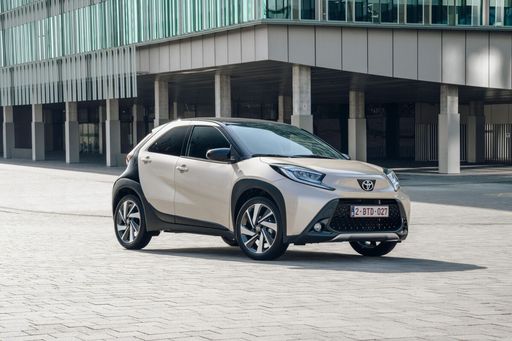
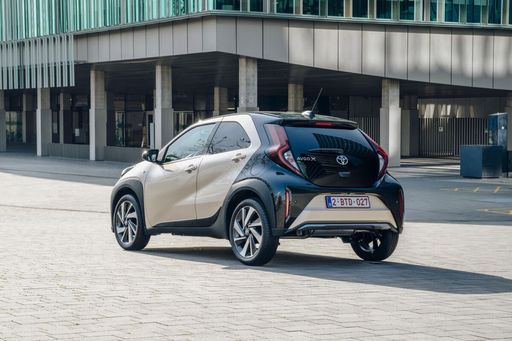
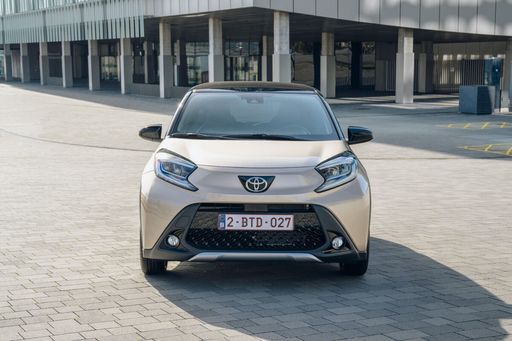
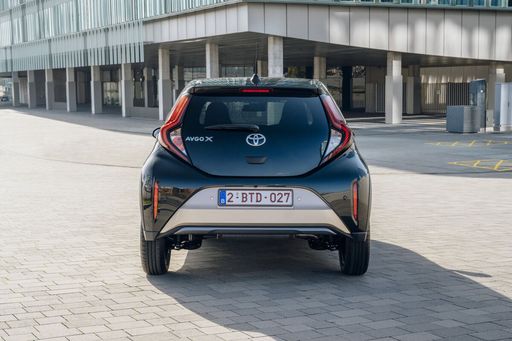
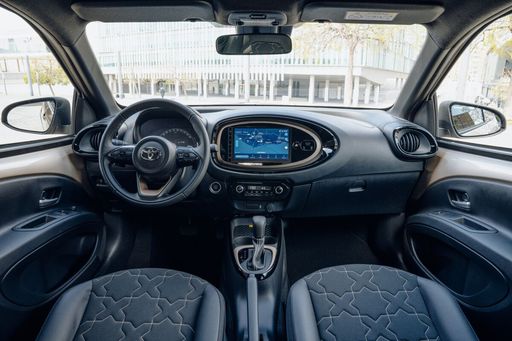
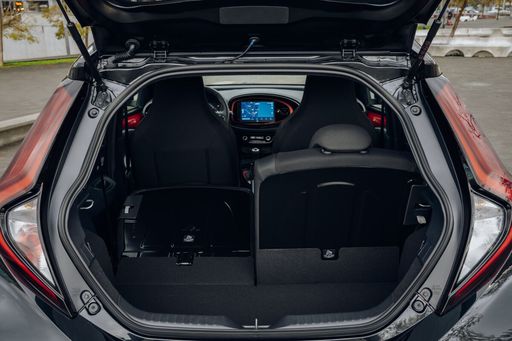
Hyundai Inster
Hyundai Inster fremstår som en pragmatisk og veludstyret bil, der prioriterer komfort og hverdagspraktiskhed frem for pynt og prangende fakter. Den leverer en rolig og sikker køreoplevelse med masser af værdi for pengene — ideel til den, der vil have pålidelig transport uden dramatik.
Detaljer
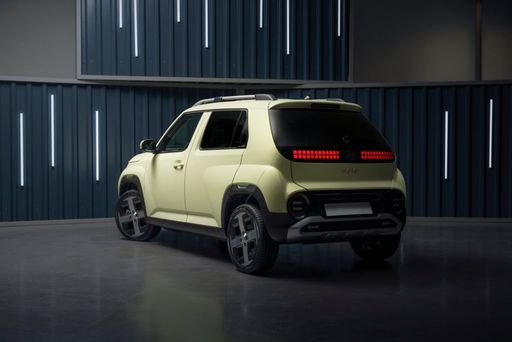
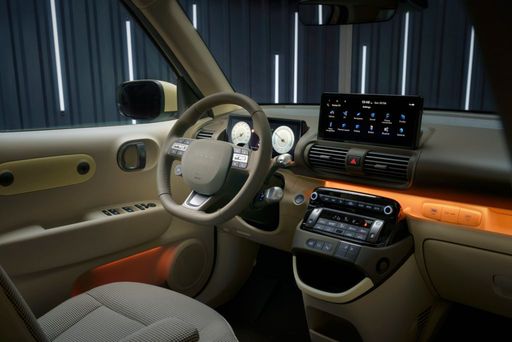
Omkostninger og forbrug |
|
|---|---|
|
Pris
141800 - 202100 kr.
|
Pris
187300 - 235900 kr.
|
|
Forbrug L/100km
4.8 - 4.9 L
|
Forbrug L/100km
-
|
|
Forbrug kWh/100km
-
|
Forbrug kWh/100km
14.3 - 15.1 kWh
|
|
Elektrisk rækkevidde
-
|
Elektrisk rækkevidde
327 - 370 km
|
|
Batterikapacitet
-
|
Batterikapacitet
-
|
|
co2
108 - 111 g/km
|
co2
0 g/km
|
|
Tankkapacitet
35 L
|
Tankkapacitet
-
|
Dimensioner og karrosseri |
|
|---|---|
|
Karrosseri
SUV
|
Karrosseri
SUV
|
|
Sæder
4
|
Sæder
4
|
|
Døre
5
|
Døre
-
|
|
Egenvægt
1015 kg
|
Egenvægt
1380 - 1433 kg
|
|
Bagagerumskapacitet
231 L
|
Bagagerumskapacitet
238 - 280 L
|
|
Længde
3700 mm
|
Længde
-
|
|
Bredde
1740 mm
|
Bredde
1610 mm
|
|
Højde
1510 mm
|
Højde
-
|
|
Maksimal bagagerumskapacitet
829 L
|
Maksimal bagagerumskapacitet
-
|
|
Lastkapacitet
345 kg
|
Lastkapacitet
317 - 357 kg
|
Motor og ydeevne |
|
|---|---|
|
Motortype
Benzin
|
Motortype
Elektrisk
|
|
Transmission
Manuel, Automatisk
|
Transmission
Automatisk
|
|
Transmissionsdetaljer
Manuel gearkasse, CVT
|
Transmissionsdetaljer
Reduktionsgear
|
|
Drivtype
Forhjulstræk
|
Drivtype
Forhjulstræk
|
|
Effekt HK
72 HK
|
Effekt HK
97 - 115 HK
|
|
Acceleration 0-100 km/t
15.5 - 15.6 s
|
Acceleration 0-100 km/t
10.6 - 11.7 s
|
|
Maks. hastighed
151 - 158 km/h
|
Maks. hastighed
-
|
|
Moment
93 Nm
|
Moment
147 Nm
|
|
Antal cylindre
3
|
Antal cylindre
-
|
|
Effekt kW
53 kW
|
Effekt kW
71 - 85 kW
|
|
Motorstørrelse
998 cm3
|
Motorstørrelse
-
|
Generelt |
|
|---|---|
|
Modelår
2024 - 2025
|
Modelår
2025
|
|
CO2-effektivitetsklasse
C
|
CO2-effektivitetsklasse
A
|
|
Mærke
Toyota
|
Mærke
Hyundai
|
Hvilke drivlinjer findes til Toyota Aygo?
Tilgængelig som Forhjulstræk.
